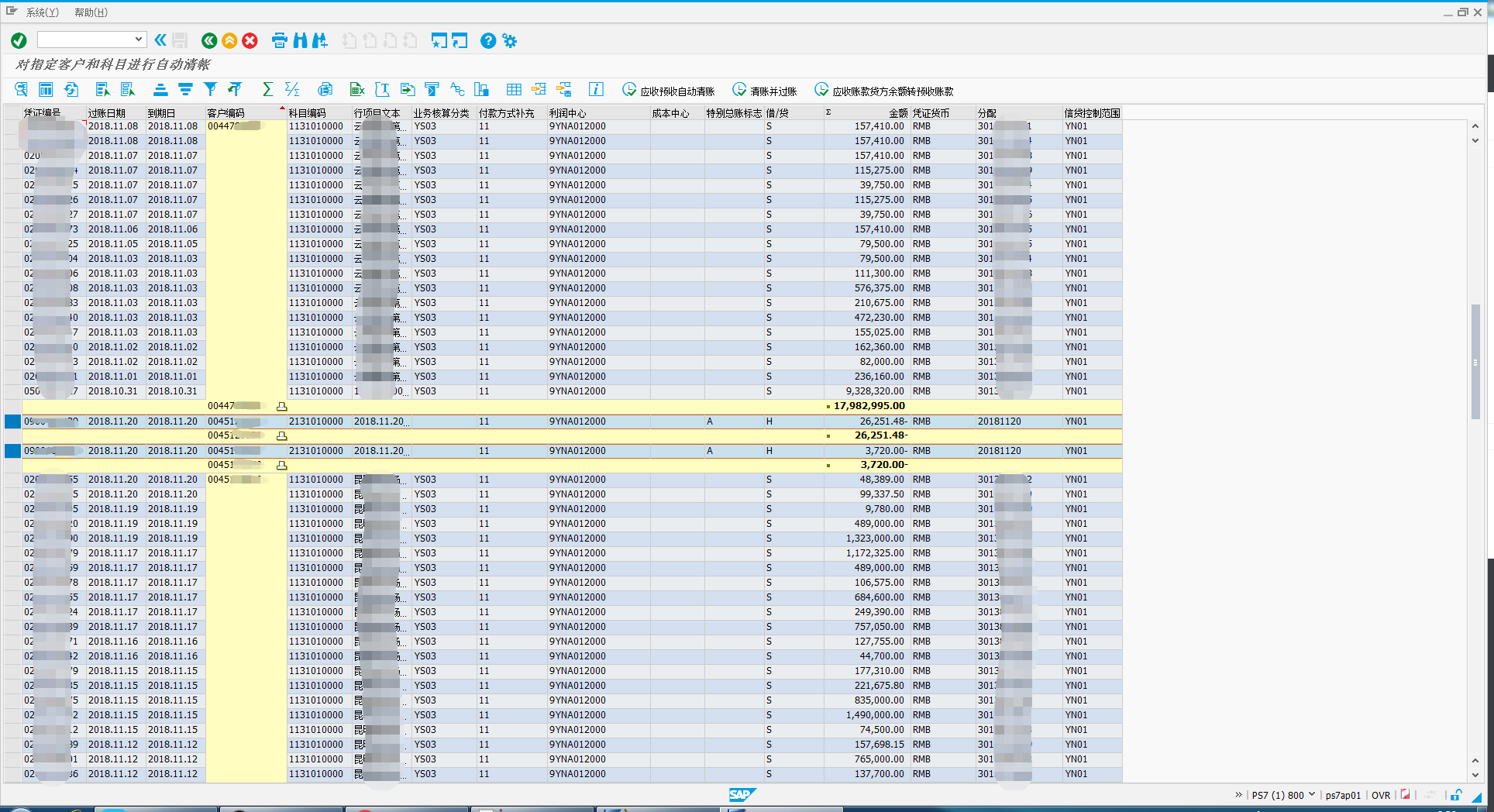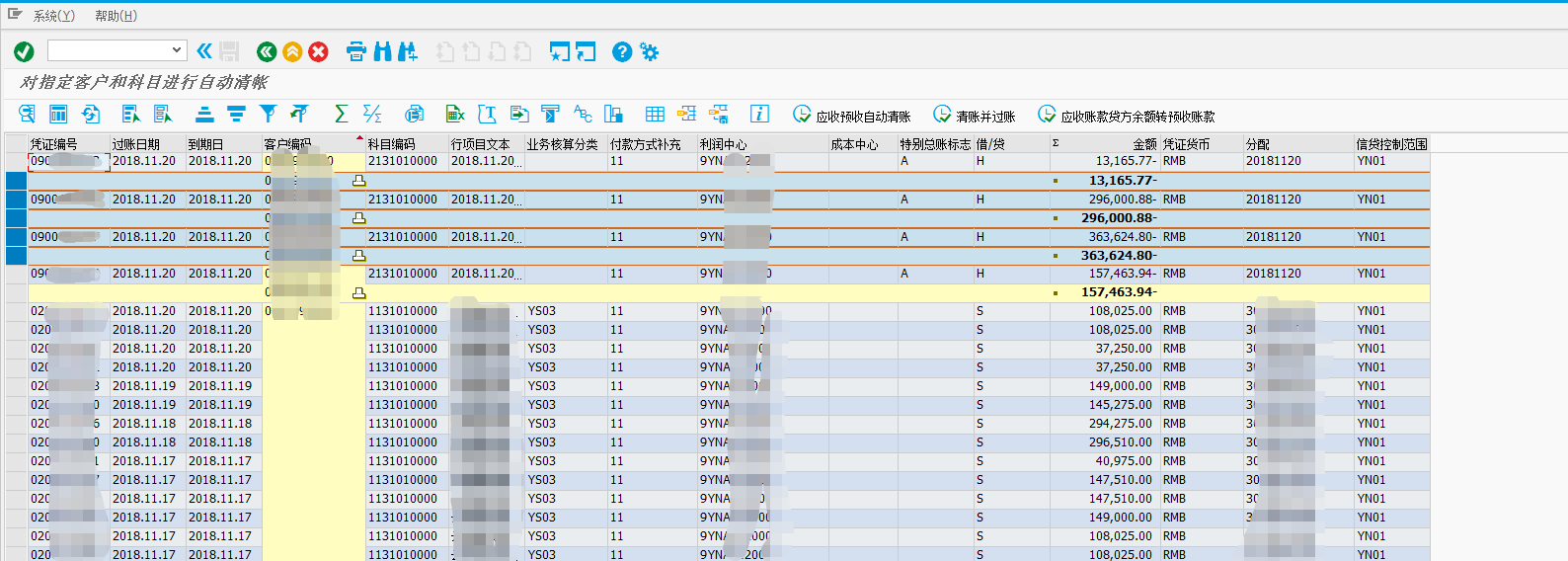【SAP】清账时选中表格指定的行
SAP 系统中进行某些清账操作时,要求只选中金额汇总(黄色的行)为负数和 0 的项目进行清账,效果如图所示:

SAP 中有一个方法可以选中指定的行:
import sys
import win32com.client
SapGuiAuto = win32com.client.GetObject("SAPGUI")
application = SapGuiAuto.GetScriptingEngine
connection = application.Children(0)
session = connection.Children(0) # 连接SAP服务
e = session.findByID('wnd[0]/usr/cntlGRID1/shellcont/shell') # 获取SAP表格
e.selectedRows = '1'
如果要选中多行只需要这样写:
e.selectedRows = '1,2,3,5'
如果是连续的行可以更简单:
e.selectedRows = '1-5'
我们运行看一下效果:

完美,另外我们知道了这个选中行是从 0 开始的。
需要注意一点,如果表很大时,表后面的部分没有加载,所以直接运行 e.selectedRows 没有效果,因此必须翻页,当翻到最后一页时运行就可以把需要的行都选中了。参考戴老板的帖子: http://support.i-search.com.cn/article/1540543334490
翻页部分代码如下:
import ubpa.ikeyboard as ikeyboard
row = e.rowCount # 行数
print(row // 44) # 需要翻页的次数,44为当前页面显示的行数
for j in range(row // 44):
ikeyboard.key_send_cs(text='{PGDN}',waitfor=10)
time.sleep(0.4)
现在有个更优秀的翻页方法:http://support.i-search.com.cn/article/1544495156668
因此还是建议少用 pagedown 进行翻页
下面开始设计算法:
我们需要三个列表,一个存金额汇总所在的行数,一个存每个金额汇总的标记(这边把金额为负和 0 的标记为负号,把金额为正的标记为正号),一个存所有负号的索引。分别命名为 index、type_index、need_index
①首先根据凭证编号遍历整张表,并把凭证编号为空行的索引加入到第一个列表中,这个就是金额汇总所在的行数:
for i in range(e.rowCount - 1):
value = e.getCellValue(i, e.columnOrder(0))
if value == '':
index.append(i)
②然后给每个金额汇总打上标记并存入第二个列表中:
for i in index:
if e.getCellValue(i, e.columnOrder(12)).endswith('-') or e.getCellValue(i, e.columnOrder(12)) == '0.00':
type_index.append('-')
else:
type_index.append('+')
③接下来只要判断第二个列表中的标记,如果为负就取这个索引与上一个索引中间的值,把所有符合条件的值都加入到第三个列表中:
if type_index[0] == '+':
for i in range(len(type_index)):
if type_index[i] == '-':
if index[i - 1] + 1 == index[i] - 1: # 如果两个金额汇总之间只隔了一行
need_index.append(str(index[i - 1] + 1))
else:
need_index.append(str(index[i - 1] + 1) + '-' + str(index[i] - 1))
elif type_index[0] == '-': # 第一个金额汇总为负号的话情况稍微复杂点
if index[0] == 1: # 第一个金额汇总前面只有一行
need_index.append('0')
else:
need_index.append('0-' + str(index[0] - 1))
for i in range(len(type_index) - 1):
if type_index[i + 1] == '-':
if index[i] + 1 == index[i + 1] - 1:
need_index.append(str(index[i]+1))
else:
need_index.append(str(index[i] + 1) + '-' + str(index[i + 1] - 1))
④need_index 现在包含了所有需要选择的行,接下来把它变成我们需要的字符串格式:
e.selectedRows = ','.join(need_index)
算法的时间复杂度还是高了点,如果你们有更好的思路也可以分享出来
完整代码
import sys
import win32com.client
import time
import ubpa.ikeyboard as ikeyboard
SapGuiAuto = win32com.client.GetObject("SAPGUI")
application = SapGuiAuto.GetScriptingEngine
connection = application.Children(0)
session = connection.Children(0) # 连接SAP服务
e = session.findByID('wnd[0]/usr/cntlGRID1/shellcont/shell') # 获取SAP表格
f = e.columnCount # 列数
row = e.rowCount # 行数
print('表格行数为{},表格列数为{}'.format(row, f))
print('-' * 20)
print(int(row / 44)) #需要翻页的次数
for j in range(int(row / 44)):
ikeyboard.key_send_cs(text = '{PGDN}',waitfor = 10)
time.sleep(0.4)
index = [] #金额汇总所在的行数
type_index = [] #每个金额汇总的正负值,若为0也标记为负值
need_index = [] #所有负值的索引
for i in range(e.rowCount - 1):
value = e.getCellValue(i, e.columnOrder(0))
if value == '':
index.append(i)
print('每个金额汇总所在的索引为{},总共的客户数量为{}'.format(index, len(index)))
print('-'*20)
for i in index:
if e.getCellValue(i, e.columnOrder(12)).endswith('-') or e.getCellValue(i, e.columnOrder(12)) == '0.00':
type_index.append('-')
else:
type_index.append('+')
if type_index[0] == '+':
for i in range(len(type_index)):
if type_index[i] == '-':
if index[i - 1] + 1 == index[i] - 1:
need_index.append(str(index[i - 1] + 1))
else:
need_index.append(str(index[i - 1] + 1) + '-' + str(index[i]-1))
elif type_index[0] == '-':
if index[0] == 1:
need_index.append('0')
else:
need_index.append('0-' + str(index[0] - 1))
for i in range(len(type_index) - 1):
if type_index[i + 1] == '-':
if index[i] + 1 == index[i + 1] - 1:
need_index.append(str(index[i] + 1))
else:
need_index.append(str(index[i] + 1) + '-' + str(index[i + 1] - 1))
e.selectedRows = ','.join(need_index)





太多了,消化不来。
666,这得慢慢消化😆 接触 SAP 多可以多多分享这方面的知识